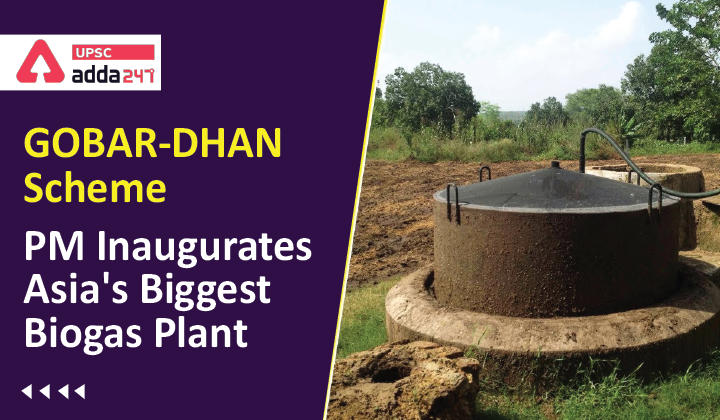Table of Contents
GOBAR-DHAN scheme: Relevance
- GS 3: Government policies and interventions for development in various sectors and issues arising out of their design and implementation.
Get Free Study Material for UPSC and State PCS Examinations
GOBAR-DHAN scheme: Context
- Recently, Prime Minister has launched Gobar-Dhan (Bio-CNG) Plant” in Indore under the overarching principles of “waste to wealth” and “circular economy” for maximising resource recovery.
Asia’s Biggest Biogas Plant: Key points
- The plant is in line with the vision of creating “garbage-free cities” under the Swachh Bharat Mission Urban 2.0.
- PM had earlier launched the Swachh Bharat Mission Urban 2.0, with the overall vision of creating “Garbage Free Cities”.
गोबर धन योजना: प्रधानमंत्री ने एशिया के सबसे बड़े बायोगैस संयंत्र का उद्घाटन किया
About the Bio CNG plant in Indore
- The Gobar-Dhan plant has a capacity to treat 550 tonnes of segregated wet organic waste per day. The plant is expected to produce around 17,000 kg CNG and 100 tonnes of organic compost every day.
- Based on zero-landfill models, the plant will not generate rejects by maximising resource recovery.
- It is also expected to yield multiple environmental benefits like reduction in greenhouse gas emissions, providing green energy along with organic compost as fertiliser.
- The project has been implemented by Indore Clean Energy Pvt Ltd, a Special Purpose Vehicle set up by Indore Municipal Corporation (IMC) and Indo Enviro Integrated Solutions Ltd. (IEISL).
- IMC will purchase a minimum of 50% of CNG produced by the Gobar-Dhan plant. In a first-of-its-kind initiative, the municipal corporation will run 400 city buses on the CNG.
- The government is working on introducing 75 more Bio-CNG plants in 75 other districts and villages to benefit farmers in the animal husbandry sector.
What is GOBAR-DHAN scheme?
- Ministry of Drinking Water & Sanitation has launched the GOBAR (Galvanizing Organic Bio-Agro Resources) – DHAN scheme in 2018.
- The scheme is being implemented as part of the Swachh Bharat Mission (Gramin).
- The scheme aims to positively impact village cleanliness and generate wealth and energy from cattle and organic waste.
- The scheme also aims at creating new rural livelihood opportunities and enhancing income for farmers and other rural people.
Also Read:





 TSPSC Group 1 Question Paper 2024, Downl...
TSPSC Group 1 Question Paper 2024, Downl...
 TSPSC Group 1 Answer key 2024 Out, Downl...
TSPSC Group 1 Answer key 2024 Out, Downl...
 UPSC Prelims 2024 Question Paper, Downlo...
UPSC Prelims 2024 Question Paper, Downlo...







